De Hongaarse schrijver Antal Szerb werd geboren op 1 mei 1901 in Boedapest. Zie ook mijn blog van 1 mei 2010 en verder alle tags voor Antal Szerb.
Uit: Journey by Moonlight (Vertaald door Len Rix)
“On the train everything seemed fine. The trouble began in Venice, with the back-alleys.
Mihály first noticed the back-alleys when the motor-ferry turned off the Grand Canal for a short cut and they began appearing to right and left. But at the time he paid them no attention, being caught up from the outset with the essential Veniceness of Venice: the water between the houses, the gondolas, the lagoon, and the pink-brick serenity of the city. For it was Mihály’s first visit to Italy, at the age of thirty-six, on his honeymoon.
During his protracted years of wandering he had travelled in many lands, and spent long periods in France and England. But Italy he had always avoided, feeling the time had not yet come, that he was not yet ready for it. Italy he associated with grown-up matters, such as the fathering of children, and he secretly feared it, with the same instinctive fear he had of strong sunlight, the scent of flowers, and extremely beautiful women.
The trip to Italy might well have been postponed forever, but for the fact that he was now married and they had decided on the conventional Italian holiday for their start to married life. Mihály had now come, not to Italy as such, but on his honeymoon, a different matter entirely. Indeed, it was his marriage that made the trip possible. Now, he reasoned, there was nothing to fear from the danger Italy represented.
Their first days were spent quietly enough, between the pleasures of honey-mooning and the gentler, less strenuous forms of sightseeing. Like all highly intelligent and self-critical people, Mihály and Erzsi strove to find the correct middle way between snobbery and its reverse. They did not weary themselves to death ‘doing’ everything prescribed by Baedeker; still less did they wish to be bracketed with those who return home to boast, “The museums? Never went near them,” and gaze triumphantly at one another.
One evening, returning to their hotel after the theatre, Mihály felt he somehow needed another drink. Quite what of he wasn’t yet sure, but he rather hankered after some sort of sweet wine and, remembering the somewhat special, classical, taste of Samian, and the many times he had tried it in Paris, in the little wine merchant’s at number seven rue des Petits Champs, he reasoned that, Venice being effectively Greece, here surely he might find some Samian, or perhaps Mavrodaphne, since he wasn’t yet quite au fait with the wines of Italy. He begged Erzsi to go up without him. He would follow straightaway. It would be just a quick drink, “really, just a glass” he solemnly insisted as she, with the same mock-seriousness, made a gesture urging moderation, as befits the young bride.”
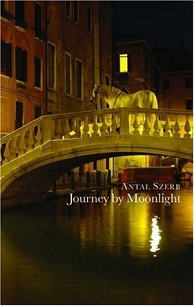
Antal Szerb [1 mei 1901 – 27 januari 1945)
Cover
De Italiaanse schrijver Ignazio Silone werd geboren op 1 mei 1900 in Pescina dei Marsi. Zie ook mijn blog van 1 mei 2010 en verder alle tags voor Ignazio Silone.
Uit: Le pain et le vin (Vertaald door J.P. Samson)
« L’institutrice rougit, s’embrouilla et personne n’y comprit plus rien. Enfin, elle eut un éclair de génie, elle imposa le silence et dit :
– La révolution rurale a sauvé le pays du péril communiste.
– Qui sont les communistes ? demanda Grascia.
La maîtresse était sauvée. Elle n’avait plus besoin de réfléchir.
– Je vous l’ai déjà expliqué plusieurs fois, mais je peux vous le répéter. Les communistes sont des malfaiteurs. Ils se réunissent de préférence la nuit, dans les égoûts de la ville. Pour devenir communiste, il faut fouler au pied le crucifix. Lui cracher à la figure et promettre de manger de la viande le vendredi saint.
– Qui la leur donne, la viande ? demanda Chatap. Ils la reçoivent gratuitement ou ils doivent la payer ?
– Je n’en ai pas connaissance, dit l’institutrice.
– En somme, protesta le vieux Grascia, le plus important, vous ne le savez jamais. »
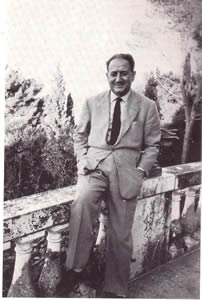
Ignazio Silone (1 mei 1900 – 22 augustus 1978)
De Poolse schrijver en dichter Alexander Wat werd geboren op 1 mei 1900 in Warschau. Zie ook mijn blog van 1 mei 2010 en verder alle tags voor Aleksander Wat.
Japanese Archery
1.
The hand tells the bowstring:
Obey me.
The bowstring answers the hand:
Draw Valiantly.
The bowstring tells the arrow:
O arrow, fly.
The arrow answers the bowstring:
Speed my flight.
The arrow tells the target:
Be my light.
The target answers the arrow:
Love me.
2.
The target tells arrow, bowstring, hand and eye:
Ta twam asi.
Which means in a sacred tongue:
I am Thou.
3.
(Footnote of a Christian:
O Mother of God,
watch over the target, the bow, the arrow
and the archer).
Vertaald door Richard Lourie
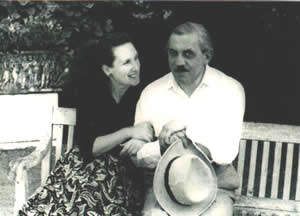
Aleksander Wat (1 mei 1900 – 29 juli 1967)
Hier met echtgenote Ola
De Russische schrijver Viktor Astafiev werd geboren op 1 mei 1924 in Ovsyanka. Zie ook alle tags voor Viktor Astafiev op dit blog en ook mijn blog van 1 mei 2010.
Uit: The Cursed And The Slain (Vertaald door Arch Tait en Martin Dewhirst)
“The soldiers grimly lugging on their shoulders and backs rifles, machine gun mounts and barrels, trench mortar bases, anti-tank guns with bumps at the ends like the rotted skulls of weird birds which snagged overhead branches and knocked down snow on them, seemed not to be returning from exercises. They were going into battle, into bloody battle. This was not a formation trudging through pine trees and wearily planting the much repaired heels of worn-out boots in the yielding sand, but men full of strength and righteous anger, with faces scorched not by frost but by the flame of battles fought. They radiated a great potency which there was no understanding or explaining, which could only be felt, and made you draw yourself up, aware of being part of this defiant world and subordinate to it. Nothing else mattered any more, everything seemed infinitely remote, even your life itself.
When the recruits were marched down into the gloom of an underground barracks where crushed pine branches thrown on the sand formed the floor, and when they were ordered to find themselves a place on plank beds made from unstripped tree trunks barely squared on the side for sleeping on, Leshka could still hear within himself the fading echoes of that defiant “Arise to fight the foe…” He was overwhelmed by a sense of fatalism. He as an individual was no longer of significance, no longer in charge of his future. There were more important matters and causes which took priority over his little self. What mattered was the tempest, the torrent he was now caught up in. His was now to march, and sing, and fight, perhaps to die at the front together with these weary masses which carried all in their path before them, roaring out that incantation, that mighty roar of a country calling all to join to fight the foe, a country over which there hung a chilling, darksome, murky threat.”
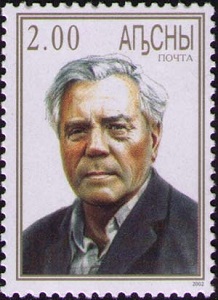
Viktor Astafiev (1 mei 1924 – 29 november 2001)
De Nederlandse dichter en schrijver Reinier van Genderen Stort werd geboren op 1 mei 1886 in Buitenzorg, Nederlands Indië.Zie ook alle tags voor Reinier van Genderen Stort op dit blog en ook mijn blog van 1 mei 2010.
Uit: De gelukzalige
“Van vader op zoon had het geslacht, waaruit Tanchelm stamde, het eerzaam bedrijf van herbergier beoefend in het welvarend stadje, gelegen aan de smalle, snelvlietende rivier, die het verkeer met andere steden en dorpen onderhield, stroomafwaarts tot de zee, stroomopwaarts naar de verten daarginds, waar de bergen blauwden. Heuvelig was het beminnelijk landschap, waarin het stadje tierde en de burcht, die het beschermde en bedreigde tevens, verhief zich op één der lage heuvelen, waarvan de vruchtbare glooiïngen bedekt waren met akkers en weiden, zoodat de boekweit, wanneer het oogsttijd was, geurde als honing en in wonderschoone schakeeringen van zoete kleuren bloeide, terwijl de bellen der kleine, gesikte geiten en der zwaargeschofte koeien melodisch weerklonken in de stilte van den avond ofwel van het zonnig middaguur, waarop een ieder rustte. Tanchelm had zijn vreugde aan deze schoone dingen en als hij zwierf met één der mooie meisjes uit het stadje in de vreedzame, harmonische omgeving, werd hij niet moede haar te wijzen op bekoringen, die, volgens zijn schalksche zeggen, de hare evenaarden. Zij echter liet haar vochtigen, smachtenden blik noode over het landschap dwalen en verloor zich liever in de zalige aanschouwing van zijn bemind wezen. En wanneer zij aldus zwierven bij middagtij en zonnegloed, terwijl de felle wijnen sliepen in de zware, blauwe druiven en hij zag hoe haar lippen voller en rooder zwollen, dan voerde hij haar mede langs de geitenpaden naar de olijfgaarde, waarvan het gras zacht als sameet was en in welker schaduw zij elkaar uitzinnig beminden.
De herbergier was een welgesteld en verstandig man en zoo liet hij den zoon, den kunstenaar, met heel zijn speelschen zin den vrijen loop. Met vaardigheid rijmde Tanchelm sonnetten, en hij teekende met enkele rassche houtskoolstreken hetportret der schoone edelvrouw, die, toevend in de herberg, terwijl haar lieden zich beijverden de karos met versche, trappelende rossen te bespannen, een oogenblik zijn betooverd model was.”
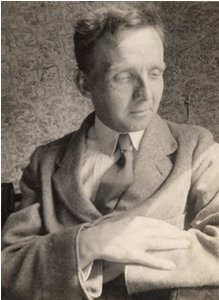
Reinier van Genderen Stort (1 mei 1886 – 7 januari 1942)
Zie voor nog meer schrijvers van de 1e mei ook mijn vorige blog van vandaag.
